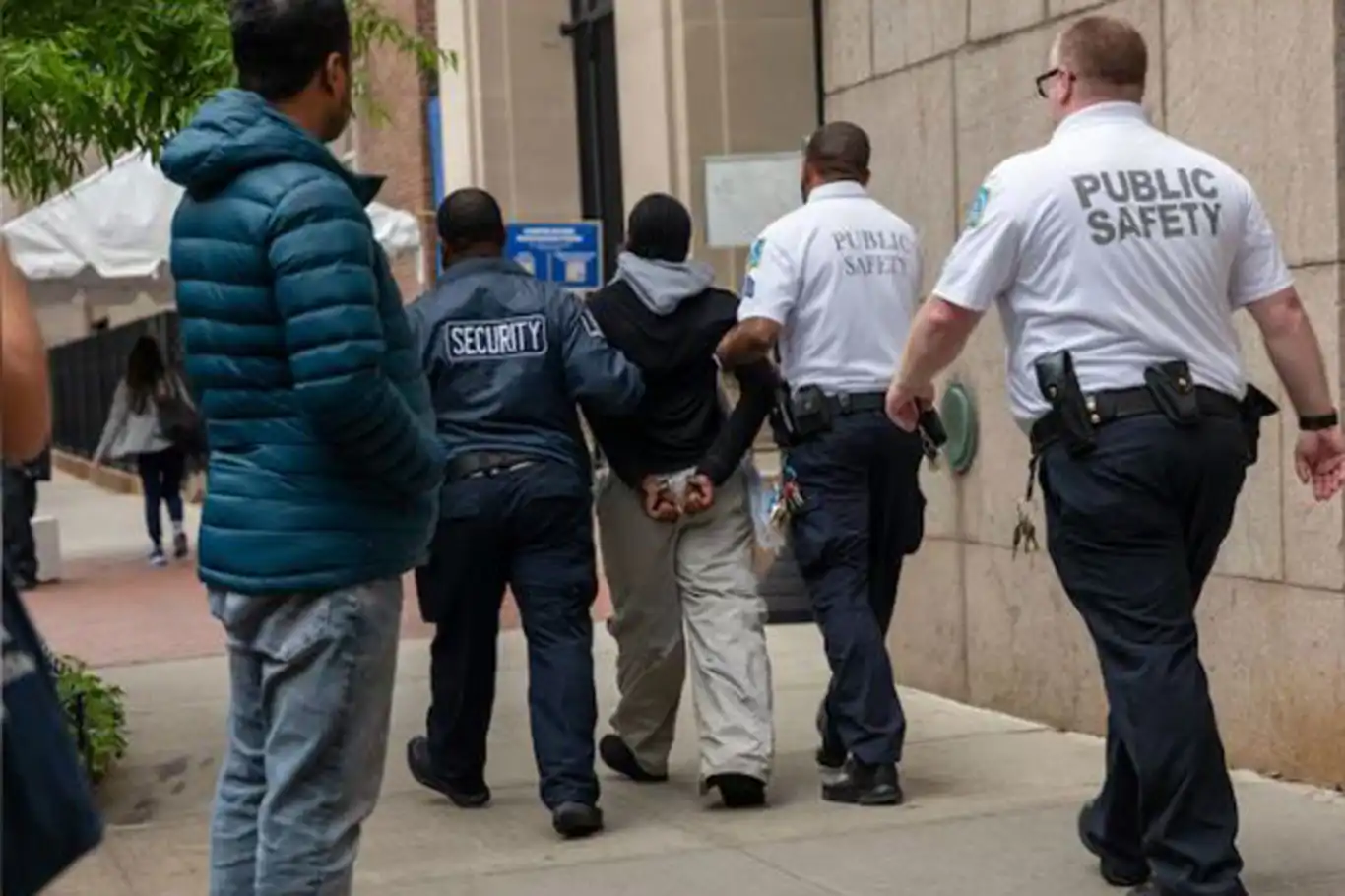U.S. cracks down on peaceful Gaza solidarity protest at Columbia University


Dozens of pro-Palestinian students were forcibly arrested by the New York Police Department (NYPD) Wednesday evening after occupying a section of Butler Library at Columbia University in a peaceful “Gaza solidarity protest.”
The heavy-handed response marks a disturbing escalation in the suppression of non-violent campus activism critical of U.S. policy toward Israel’s campaign in Gaza.
Sit-In Met with Riot Police
Organized by Columbia University Apartheid Divest (CUAD), protesters entered the library’s reading room around 3 p.m., locking arms, chanting “We have nothing to lose but our chains!” and renaming the space the “Bassel al-Araj Popular University” in tribute to the slain Palestinian intellectual. Demonstrators used bullhorns, stood on desks, and displayed banners reading “strike for Gaza,” while distributing pamphlets demanding Columbia divest from corporations profiting from the Israeli offensive in Gaza.
Despite issuing repeated warnings to vacate, university officials called in the NYPD. At approximately 6 p.m., officers in riot gear stormed the room, zip-tying and arresting around 75 students, according to campus newspaper The Columbia Daily Spectator. Footage shows peaceful activists thrust onto police buses, raising questions about the proportionality of the response to an unarmed sit-in.
Acting President Claire Shipman defended the police intervention as necessary to “secure the safety of our community,” even as two university public safety officers suffered minor injuries. Protesters, many of whom were first-time dissenters, reported being “kettled” and blocked from exiting before officers arrived—a tactic critics decry as a violation of basic civil liberties.
Political Pressure and Visa Threats
The arrests drew swift condemnation from campus free-speech advocates and rights groups. Yet high-level officials applauded the crackdown. New York Mayor Eric Adams labeled the demonstration “unacceptable,” and Governor Kathy Hochul praised the NYPD while warning against “vandalism and property damage.”
On the federal level, Secretary of State Marco Rubio threatened to revoke visas of international student protesters, calling them “Pro-Hamas thugs” unfit to remain in the United States. This follows prior detentions of Palestinian students—such as Mohsen Mahdawi and Mahmoud Khalil—who vocalized opposition to the Gaza siege.
Federal Funding and Oversight Loom
Last year’s anti-war demonstrations led the Trump administration to pull $400 million in research grants from Columbia for allegedly allowing antisemitism to flourish. Now, The Wall Street Journal reports federal officials have offered Columbia a binding consent decree to oversee campus policies—effectively placing the university under judicial supervision unless it curbs peaceful protest.
Columbia faces a stark choice: accept the decree, sacrificing institutional autonomy, or brace for a legal battle that could invite harsher federal sanctions. Meanwhile, new campus rules ban masks at demonstrations, require student IDs during protests, and empower an expanded public-safety force—measures widely criticized as chilling dissent.
A Broader Assault on Academic Freedom
Civil-rights groups warn that these actions represent a coordinated effort by U.S. authorities to stifle criticism of Israeli policy and punish solidarity with Gaza’s civilian population. As the Gaza conflict enters its 600th day and international outrage grows over mounting civilian casualties, Columbia’s library sit-in was a reminder that free expression—and the right to protest—is under siege as much as Gaza itself.
“The same logic that justifies bombing schools in Gaza is now applied to policing dissent on U.S. campuses,” said a spokesperson for the ACLU of New York. “Peaceful protest is not a crime—it is the lifeblood of democracy.”
With arrests still processing and visa revocations threatened, Columbia students and professors vow to continue non-violent solidarity actions—despite increasing pressure from university leadership and government authorities determined to silence them. (ILKHA)
LEGAL WARNING: All rights of the published news, photos and videos are reserved by İlke Haber Ajansı Basın Yayın San. Trade A.Ş. Under no circumstances can all or part of the news, photos and videos be used without a written contract or subscription.
Millions of Yemenis flooded the streets of the capital Sanaa and public squares in 14 governorates on Friday, reaffirming their steadfast support for the Palestinian people and resistance movements in Gaza.
Chilean authorities confirmed on Friday that a small ambulance aircraft carrying six people has been found crashed near the town of Curacaví, west of the capital Santiago. Tragically, there were no survivors.
Medical sources in Gaza reported Friday that the death toll from Israel’s ongoing military onslaught on the Gaza Strip has soared to at least 52,787, with the number of wounded rising to 119,349, as the humanitarian catastrophe deepens in the besieged enclave.
Sayyed Abdul-Malik al-Houthi, the leader of Yemen’s Ansar Allah movement, emphatically rejected U.S. President Donald Trump’s claims that Yemen’s stance on the Palestinian cause was born out of weakness or surrender.